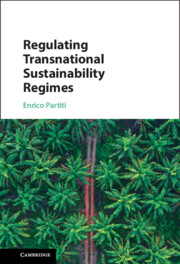Book contents
- Regulating Transnational Sustainability Regimes
- Regulating Transnational Sustainability Regimes
- Copyright page
- Contents
- Acknowledgements
- Abbreviations
- Introduction
- 1 Features, Typologies and Effects of Voluntary Sustainability Standards
- 2 Public Authority and Voluntary Sustainability Standards
- 3 Voluntary Sustainability Standards Under EU Competition Law
- 4 Voluntary Sustainability Standards and EU Market Regulation
- 5 Attribution and Expected Conduct of WTO Members Towards Voluntary Sustainability Standards
- 6 Transposing Technical Barriers to Trade Agreement Meta-rules to Voluntary Sustainability Standards
- Conclusion
- Bibliography
- Index
5 - Attribution and Expected Conduct of WTO Members Towards Voluntary Sustainability Standards
Published online by Cambridge University Press: 12 May 2022
- Regulating Transnational Sustainability Regimes
- Regulating Transnational Sustainability Regimes
- Copyright page
- Contents
- Acknowledgements
- Abbreviations
- Introduction
- 1 Features, Typologies and Effects of Voluntary Sustainability Standards
- 2 Public Authority and Voluntary Sustainability Standards
- 3 Voluntary Sustainability Standards Under EU Competition Law
- 4 Voluntary Sustainability Standards and EU Market Regulation
- 5 Attribution and Expected Conduct of WTO Members Towards Voluntary Sustainability Standards
- 6 Transposing Technical Barriers to Trade Agreement Meta-rules to Voluntary Sustainability Standards
- Conclusion
- Bibliography
- Index
Summary
Chapter 5 extends the analysis to public international law and international trade law. It aims to understand what is the expected behaviour of WTO Members towards VSS. The chapter begins by assessing the possibility of attributing VSS conduct to WTO Members under the customary rules for attribution and their transposition to the General Agreement on Tariffs and Trade (GATT). The chapter analyses EU practice towards VSS against such a framework to clarify under which circumstances public use of VSS and coordination of regulatory effects give rise to attribution and would make Members responsible for WTO-inconsistent effects of VSS. Chapter 5 then scrutinises the TBT provisions applicable to WTO Members. The chapter discusses whether VSS bodies can be considered as non-governmental standardising bodies under the TBT Agreement. Subsequently, it studies the due diligence obligation for Members in Art. 4.1 TBT that requires them to take reasonably available measures to ensure that non-governmental standardising bodies act in line with the principles in the TBT Code of Good Practice, and the requirement in Art. 4.1 TBT not to encourage deviations from the TBT Code.
Keywords
- Type
- Chapter
- Information
- Regulating Transnational Sustainability Regimes , pp. 193 - 239Publisher: Cambridge University PressPrint publication year: 2022

